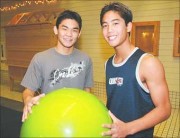 In SFGate today, Jeff Yang talks about the clashing ideas of Asian American identity among generations, namely my generation (people born in the 70s) and older, and those who are in their teens and 20s. He brings up issues that have dominated, and continue to dominate dialogue among Asian Americans of my generation (and apparently, of a very small portion of the generation younger than me): our foreignness–or that we’re seen as the perpetual foreigner/outsider (because of our accents and mainstream American society’s apparent inability to really see Asians as Americans); and Asian women as sex objects (without any agency on their own, of course, to want to be sex objects).
In SFGate today, Jeff Yang talks about the clashing ideas of Asian American identity among generations, namely my generation (people born in the 70s) and older, and those who are in their teens and 20s. He brings up issues that have dominated, and continue to dominate dialogue among Asian Americans of my generation (and apparently, of a very small portion of the generation younger than me): our foreignness–or that we’re seen as the perpetual foreigner/outsider (because of our accents and mainstream American society’s apparent inability to really see Asians as Americans); and Asian women as sex objects (without any agency on their own, of course, to want to be sex objects).
To that end, Asian Americans of my generation (GOD, I hate saying that term!) especially those of us who are academics or otherwise involved in popular culture appear to be stuck. Yang also talks about how mainstream American perceptions of Asians has changed, slowly–being integrated into mainstream shows; and how we’ve started to complicate our own perceptions of how we, as Asians, belong in America as both Americans and Asian Americans. But at the same time, Yang also talks about how we’re missing out on other Asian voices, who are reaching teenage and 20-something Asian Americans in ways that “we” never thought of, especially on YouTube, such as HappySlip, and nigahiga.
For me, that’s one of the things that was really frustrating about being in Asian American studies, and looking at the media. I got sick of people looking at both mainstream American society and Asian American identity as these monolithic things, identities and subjects that can’t or won’t change. While people are ranting on and on about the topics that I’ve just mentioned, it’s great to see people taking the dialogue of what it means to be Asian in American society to different places, especially to see how Asian American identity is evolving, and to frankly see how mainstream American culture is evolving with it to integrate Asians as part of the American landscape. It’s nice to see that we’re not just obsessed over constantly looking at Asian women as sex objects lacking agency, somehow needing an Asian man to see the error of her ways (roll eyes), or that we will always be “exotic” or “not belonging”. If anything, it’s showing how the ability of people to be able to access new forms of media and to provide new voices into the dialogue of Asian American identity that we couldn’t see or hear before–and to finally develop some new ways to see Asian America.
And frankly, it’s nice to see other Asian Americans who aren’t neurotic or hung up about their identities.
- Excited
- Fascinated
- Amused
- Disgusted
- Sad
- Angry








